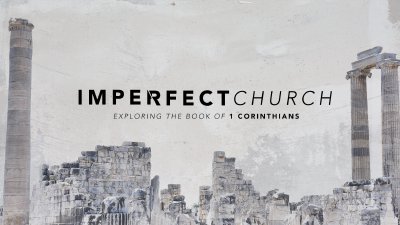


Imperfect Church
Exploring the Book of 1 Corinthians
Imperfection that Brings Hope
December 5, 2021 • Chan Mitchell
1 Corinthians 16 concludes Paul's long letter to the church in Corinth. In this final chapter, Paul offers some practical applications to help maintain unity in the Body. He instructs them on how to prepare a special collection of funds for needy Christians in Jerusalem. He describes his plan to visit them in person after wrapping up his ministry in Ephesus and stopping by churches in Macedonia. He reveals that Timothy and other leaders will be visiting them soon. Finally, Paul commends a team of faithful servants from Corinth that came to minister to him. Paul’s final words in the letter are a declaration of love for all.
Mystery and Victory
November 28, 2021 • Chan Mitchell
Our work in the Lord is not a waste of time. Our service is not in vain. Our worship is not a waste. Because of the resurrection, what we give for the cause of Christ and His kingdom has eternal value. 1 Corinthians 15:50–58 powerfully concludes Paul's teaching on the resurrection of Christ and His believers. When the last trumpet blasts and Christ returns for those who belong to Him, all believers in Jesus, living and dead, will be transformed into the glorified, eternal bodies God has promised us. Death will be defeated forever, never to hurt anyone again. Sin brings death, and the law is the power of sin, but God has given us the victory over death by forgiving our sin through faith in Jesus and by His grace.
The New Body
November 21, 2021 • Chan Mitchell
Just as in the days of the Apostle Paul, there seems to be a growing skepticism today around Jesus, His death and resurrection. However, few passages are more helpful in restoring our confidence than 1 Corinthians 15:35-39 and its promise of resurrection life. Paul makes a strong argument to skeptics in Corinth by drawing truth from creation in the way a seed comes to life, and in the way dust becomes glory. For those who trust in Christ, Paul says what is buried in the dust will be resurrected in the likeness of Christ. Utilizing a variety of analogies, Paul describes the indescribable - namely the way in which children of Adam formed from the dust of earth are raised to new life, given glorified bodies, and share in Christ’s heavenly glory.
Because of The Ressurection
November 14, 2021 • Chan Mitchell
What if the resurrection never occurred? What if Mary and Mary Magdalene had walked up to the tomb and didn’t find the stone rolled away? Without the resurrection, the disciples would have never started the church. Without the resurrection, Jesus was just another man. Without the resurrection, there would be no Christianity, no peace, and no hope. The resurrection changed everything, and the resurrection changes everything for us. We may still experience the consequences of sin and may face strained relationships along with financial, emotional, or physical struggles. We still endure pain and may shed tears because of problems or troubles in the world. However, because Jesus rose from the dead, we who are in Christ will also be raised to eternal life to be with Christ forever. Because the tomb is empty, death doesn’t have the last word.
The Resurrection of Christ
November 7, 2021 • Chan Mitchell • 1 Corinthians 15:1–11
Just as the heart pumps life giving blood to every part of the body, so the resurrection is the gospel life to our souls. The resurrection is the cornerstone of our faith. First Corinthians 15:1–11 describes the gospel as it was delivered to Paul and as he delivered it to the Corinthians. It begins with the death of Christ on the cross for our sins, but it continues to His burial and, most significantly, His resurrection. The risen Christ appeared to many people still alive at the time Paul wrote his letter. Paul exhorted that the Corinthians believe the gospel, including faith in the physical resurrection of Jesus from the dead. Paul connects faith to belief in the resurrection of all believers from the dead.
Orderly Worship
October 31, 2021 • Chan Mitchell
The word “edify” means to “build up”. The Apostle Paul teaches that edification is the primary benefit for the Body of Christ when it gathers for worship. Everything we do in our worship gatherings should be done in such a way as to edify the church and glorify God. This includes how we exercise our spiritual gifts. In 1 Corinthians 14:26-40, Paul teaches that orderliness and building up the church are guiding principles for any worship gathering. In doing so, the Church reflects God's own character. For our God is not a God of confusion.
Prophecy and Speaking in Tongues
October 24, 2021 • Chan Mitchell • 1 Corinthians 14:1–25
In 1 Corinthians 14, Paul addresses the issue of prophecy and speaking in tongues. Paul insists that without love, all spiritual gifts become worthless and even destructive. Paul encourages the Corinthians to especially desire the gift of prophecy. He explains why its use in the church service is superior to the use of the gift of tongues if nobody is available to interpret. Prophecy benefits everyone; praying in tongues benefits only the speaker if there is no interpretation. Paul explains that all things must be done properly and in order. Orderliness and building up the church are guiding principles for any worship gathering.
Love
October 17, 2021 • Chan Mitchell
The word “love” has been used in many forms and meanings all throughout human history. The way people express love varies between culture and circumstances. Love can be expressed as being kind to one person or cruel to another. It is important to understand what God is trying to teach us about love and how it is defined in His Word, even if we cannot fully comprehend His love for us. Jesus was the ultimate example of love by showing us patience, kindness, righteousness, truth, endurance, and much more described in 1 Corinthians 13. Love is the greatest because God showed us, through His Son Jesus Christ, how great His love is for us.
One Body, Many Parts
October 10, 2021 • Chan Mitchell
The human body is amazing. Each part depends on the other parts. We have all experienced how something as simple as a toothache can affect other parts of the body. While every part has an important role to play, no part is independent. All parts must work together so that the body can function well as a whole. So, it is no surprise that Paul often describes the church as Christ's body. Followers of Jesus are interrelated with every other person in the body of Christ. Though each believer may be unique, each believer is also dependent on the rest. Like interrelated body parts, church members must work together in unity and oneness of purpose to help bring about the coming of God's kingdom.
Spiritual Gifts
October 3, 2021 • Chan Mitchell
Spiritual gifts are something every believer is given when they receive the gift of salvation. We don’t choose our gift(s), and we don’t earn our gift(s). Our spiritual gift(s) are the equipment God gives us to do what He asks us to do. He will never ask us to do something He hasn’t already equipped us to do. Our spiritual gifts(s) are not for our own benefit. They are given to us to serve other people and build up the Body of Christ. When you use your spiritual gift, it blesses others in the Body. When others in the Body use their spiritual gift, it blesses you. It’s like a puzzle. If one piece is missing, the picture is not complete. When we develop and use our spiritual gift(s), we all experience the blessing of unity and peace in Christ.
The Lord’s Supper
September 26, 2021 • Chan Mitchell
It’s been said, "The main thing is to make sure the main thing is the main thing." The question, of course, is, "What is the main thing?" The answer in the Christian life is that the "main thing" is the person and work of Jesus Christ. It is very fitting that Paul ends this long section in chapter 11 by holding up a mirror before the Corinthians and allowing them to see how they were behaving at the Table of the Lord. Nothing is more revealing than to see what our attitude is when we come to the Lord’s Supper. Paul’s point is that we are to approach the Lord’s Supper thankfully, worshipfully and humbly.
Headship and Submission
September 19, 2021 • Chan Mitchell
This passage is probably one of the most difficult and misunderstood passages in 1 Corinthians because Paul uses words and ideas that he assumes his Corinthian readers will understand. However, the issues and questions Paul addresses in this passage fly in the face of the politically correct culture we live in today. Specifically, Paul tackles the issue of how men and women were to conduct themselves in public worship, respecting culturally relevant gender markers like head coverings, hair lengths, and hairstyles as a way of honoring God and each other. Paul explains the biblical purposes of headship and submission to emphasize that men and women were both created equally in the image of God but were also created uniquely for different roles.
The Believer’s Freedom
September 12, 2021 • Chan Mitchell
For followers of Christ, asking the question, ''Is this lawful?'' is the wrong question. Instead, we should ask ''Will this glorify God?'' and ''Will this build up my neighbor?'' In 1 Corinthians 10:23-11:1, Paul instructs the Corinthian Christians to seek edification over gratification and seek liberty over legalism. The key message of this passage is that our freedom in Christ is meant to be held onto loosely, especially if by giving up our freedom we help someone else find it in Christ.
Warning from the Wilderness
September 5, 2021 • Chan Mitchell
In many ways, the Corinthians had abused the freedoms they had in Christ. In some cases, they were using their liberty as a license to sin. Such an attitude stands in stark contrast to what the Word of God teaches regarding obedience to the Lord. In 1 Corinthians 10, Paul points to Israel's dark history as an illustration of how (or how not to) behave in our Christian life. Israel's relationship with God did not exempt them from sin nor the judgement of God. The same is true for the church today. We must heed the warnings from the wilderness.
Win by Losing
August 29, 2021 • Chan Mitchell • 1 Corinthians 9:9–27
Every Christian is called to govern his or her life with eternal values in view. Paul taught that followers of Christ must be willing to lose (or set aside) their personal rights and freedom in order to win people for Christ. This calling is not easy and requires discipline and hard work. Paul’s illustration from the Greek games would have been familiar to his readers living in Corinth. The contestants had to discipline themselves and lay aside even good things in order to win a prize. If athletes can give up their rights in order to win a fading crown, certainly Christians can lay aside privileges to win an eternal crown. Only one athlete can win an event, but all Christians are given the opportunity to win Christ’s approval.


